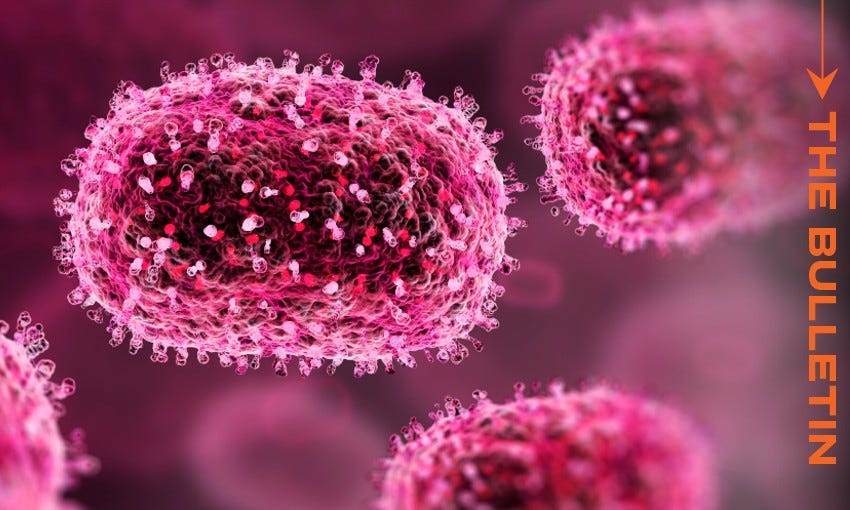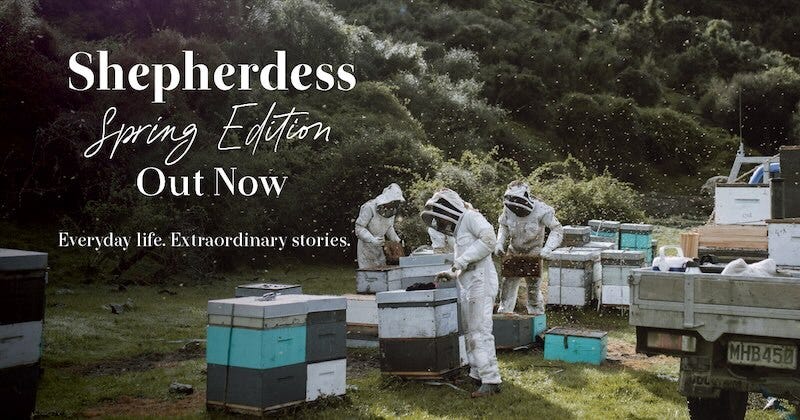Should we be more worried about mpox?
Two new cases have been confirmed and the green light has now been given for easier vaccine access.
Mōrena, and welcome to The Bulletin for Thursday, September 12.
In today’s edition: Kamala Harris scores a major endorsement, David Seymour goes public with official advice criticising his treaty bill, and Wayne Brown argues for a second bridge across the Auckland Harbour. But first, there are now two confirmed mpox cases linked to an event in Queenstown.
Two cases confirmed, more likely
Mpox, once called monkeypox, is back in the country. There are now two confirmed cases, both with links to the Winter Pride Festival in Queenstown. And as with any infectious disease, there could be more to come. But while the arrival (or in this case, the return) of mpox may instantly bring back unwanted thoughts of the Covid-19 pandemic, we’re unlikely to see any of the widespread health measures from that period reinstated. As microbiologist Siouxsie Wiles explained in this 2022 piece for The Spinoff, “elimination [of mpox cases] means getting at risk people vaccinated, making it easy for people to get tested and to self-isolate, and using contact tracing to break any chains of transmission”.
But the question is, are we doing any of that sufficiently? While the virus, wrote RNZ’s Katie Kenny, isn’t the “new Covid”, that doesn’t mean it should be ignored. Contracting mpox, which is primarily spread through close contact, can cause flu-like symptoms and painful rashes, and can still be fatal, though the mortality rate is relatively low. It is especially dangerous for immunocompromised people. So what’s being done to stop its spread, and should we be doing more?
A global outbreak
First, some context. As mentioned, this isn’t the first time mpox has been detected in New Zealand. Since 2022, there have been 55 cases of the “clade 2” variant of mpox in New Zealand. An outbreak of the more severe clade 1 variant in multiple African nations prompted the World Health Organisation to declare it a global health emergency in August, the second time it has made that call since 2022. The new cases detected in Queenstown are unrelated to that outbreak, reported RNZ’s Samuel Robinson, meaning the risk of a widespread outbreak still remains low. No cases of clade 1 have been detected in New Zealand or neighbouring nations.
In the Democratic Republic of Congo, reported NPR, there have been more than 20,000 suspected cases of the virus this year, causing hundreds of deaths as health workers plea for further shipments of vaccine. That outbreak has other countries on high alert. The United States is preparing for the clade 1 variant to arrive, while cases have been detected in disparate countries like Thailand and Sweden.
Wider access to vaccine confirmed
Mpox affects primarily, but not exclusively, gay, bisexual and other men who have sex with men. As Wiles noted in her 2022 piece, “stigma and prejudice surrounding homosexuality can stop people seeking a test or treatment, getting vaccinated, or self-isolating if they need to”. But that can be easier said the done. The Post’s Rachel Thomas reported this week that the wait time for a vaccination in Wellington was 10 months, unless people pay $85 to be seen faster. “I thought [that] was a really large amount for a preventative vaccine and a little bit outside my means,” said a concerned member of the public.
In welcome news for those seeking the vaccine, the government confirmed yesterday it would make it easier for people to access it. Since last year, explained Thomas in a follow-up report, the mpox vaccine has been administered under a special provision in the Medicines Act. However, it had not been given Medsafe approval and so could not be promoted and nor could it be given without a detailed consultation with the patient. Associate health minister David Seymour said Medsafe had now given provisional approval for the vaccine and established an advisory group to determine which groups were at greatest risk.
What else can we be doing?
Edwin Reynolds, medical advisor at the Immunisation Advisory Centre, in comments to the Science Media Centre, said that wider access to the vaccine was welcome. "The mpox vaccine is being delivered to the most at-risk via sexual health clinics but this announcement means other providers will be able to access the vaccine for their patients,” he said.
But while that will assist with controlling the current outbreak here, professor Michael Baker believed we should be doing more to assist other countries. With the nastier clade 1 variant spreading rapidly, it may only be a matter of time before it arrives here. “Aotearoa New Zealand should also review its overseas aid contribution and support for programmes that could assist prevention and control of the severe mpox epidemic in Africa,” Baker said.
Shepherdess Kōanga Spring Edition out now
Spring has arrived and with it, the new edition of Shepherdess magazine. Meet the beekeepers on rugged Bluff Station in the Clarence Valley, visit an Angus stud at Wairoa, and wander through a field of roses with fifth-generation growers in Whanganui. Plus more extraordinary stories from across Aotearoa New Zealand, along with recipes, art and snippets of rural life. Shepherdess magazine is for the rural and rural at heart, on sale now at dairies, supermarkets, and specialty book and design stores across the motu.
To purchase online, or to start a subscription, head to their website. (sponsored)
Official advice raises concerns over Seymour’s treaty bill
We now know more about what the controversial Treaty Principles Bill will look like after David Seymour proactively released a cabinet paper laying out the proposed principles. As Stuff’s Glenn McConnell reported, it confirmed the principles agreed to by cabinet differed from those Act campaigned on (David Farrar at Kiwiblog has helpfully put together a table showing the different iterations here). But the documents willingly released by the government also showed the strong opposition from officials, including that the bill “calls into question the very purpose of the treaty and its status in our constitutional arrangements”.
It can only be interpreted in that releasing the arguments against his own bill, David Seymour is in this for the long haul. It was also confirmed this week that the bill will go through the standard six month select committee process, meaning Waitangi commemorations will take place right in the middle of the public consultation period.
Writing for The Spinoff today, ātea editor Liam Rātana argues that Seymour’s efforts to define the treaty put Act on a path that could “seriously harm both their party and Māori-Crown relations”, noting contradictions within the proposed principles.
By simplifying Treaty principles into an “equal rights for all” framework, Act has misread the wider sentiment that values the Māori partnership and the ongoing reconciliation of historical grievances.
How can everyone be part of the AI revolution?
AI technology is an increasingly common part of many people’s working lives – but not everyone has the opportunity to benefit equally. “Technologies can create divides, but they can also help to overcome them,” says Dr Jade Brooks of the University of Auckland Business School.
She’s researching how workplaces can bridge the digital divide, not just through improving overall access to technology but by exploring how people from different demographics are included or excluded, and ultimately how it impacts their job performance. Read the story here. (sponsored)
Has the dial shifted in US presidential race?
Kamala Harris faced off against Donald Trump for the first time yesterday, in a fiery debate that many observed as a victory for the Democratic contender. In many ways, the debate was Trump’s to lose – it would be hard to find anyone who doesn’t already have an opinion on the former president, while Harris has shied from questions since entering the race. Stephen Collinson of CNN said that the only thing Trump won yesterday was the coin toss deciding the order of the closing remarks. “From Harris’ point of view, the night could hardly have gone better,” he wrote. But, he argued, a victory in a debate doesn’t necessarily mean a victory on election night.
Arguably the most significant moment for Harris came after the debate, with pop star Taylor Swift formally endorsing the current vice president and taking aim at Trump. This piece for Vox looks at the significance of celebrity endorsements, noting that they don’t always mean much when it comes to the ballot box.
We’ll have more on the reaction to the debate in today’s edition of the World Bulletin for Spinoff Members, so check your inbox later on if you’re a subscriber or join here.
Party like a 10 year old
You have until Sunday to go in the draw to win a mega hamper of goods ranked by The Spinoff. All you have to do is have your say on Hera Lindsay Bird’s ranking of our rankings. If you’re a member, you can get an extra entry by logging in and collecting the treasure hidden in stories posted this week. Find out more here.
Not a member? Now is a great time to show your support. We cannot overstate how vital support from our readers is, so thanks for being part of our story. Ten years, 29,000 articles published, all free to read, we wouldn’t have made it to this mighty milestone without you.
Click and Collect
Something I’m sure we’ll be talking about more in the near future is the government’s proposed gang patch ban as it comes up for its final reading in parliament. The Post reports that a last-minute amendment to the legislation has been criticised by the Law Society as a breach of the Bill of Rights.
Auckland mayor Wayne Brown is urging the government to abandon plans for a tunnel under the Waitematā Harbour and build a second bridge instead.
Minister Shane Jones hasn’t held back when discussing the closure of Winstone Pulp’s central North Island mills, saying the worst could be yet to come. (NZ Herald, paywalled)
Speaking of, more manufacturing jobs are on the line as Methanex considers downsizing.
ACC is proposing increases to levies to cover rising injury numbers and costs.
For BusinessDesk subscribers, here’s an update on New Zealand’s first Ikea store due to open in 2026. (paywalled)
We talked recently about David Seymour’s regulation ministry. Andrea Vance reports for The Post that it’s spent more than $400,000 on consultants in six months.
More on The Spinoff’s 10th birthday! In North and South, the three past and present editors discuss how we ended up where we are today. Plus, on The Spinoff this morning, a host of current and former writers divulge the story they regret writing the most (please forgive us).
Tara Ward power ranks week one of Celebrity Treasure Island. For The Spinoff’s 10th birthday, we've also compiled a list of stories that define The Spinoff. Sam Brooks attends Spark's inaugural gaming festival for the kids, and kids at heart. Alex Casey recaps a truly wild musical episode of Shortland Street which aired on 9/11, 2001. Author Sascha Stronach describes the tradeoffs to keep your voice and soul while writing for an international market.
Pop culture picks, with Alex Casey
What you should be reading from the world of entertainment.
I’ve been in a flurry with Spinoff birthday business so confess I haven't actually read this yet, but this weekend I will be diving into this Rolling Stone feature about the stratospheric rise of Chappell Roan. Great first line – "do you want to bedazzle my grinder?" – so I trust it will be a goodie.
The Spinoff turned 10 this week and so did Amelia Dimoldenberg's Chicken Shop Date, which is crazy. This feature on The Cut is a great look back at the origins – "podcasts were not yet YouTube channels. Magazines weren’t forcing ensemble casts to endure rounds of trivia or play with puppies”.
Suzanne Paul has brought her natural glow to Celebrity Treasure Island, and discussed her life in beauty with the good folks at Ensemble. "I know what suits me and what doesn’t – I’m not going to have massive feathery eyebrows because it’s the trend."
That’s it for this morning, thanks for reading. I’ll catch you back tomorrow.
Want to get in touch? Join the conversation in the Substack comments section or via email at thebulletin@thespinoff.co.nz if you have any feedback on today’s top stories (or anything else in the news).
If you liked what you read today, share The Bulletin with friends, family and colleagues.




















You write that 'In the Democratic Republic of Congo ... there have been more than 20,000 suspected cases of the virus this year, causing hundreds of deaths ... Mpox affects primarily, but not exclusively, gay, bisexual and other men who have sex with men....'
So is the Congo a very gay place ... or is the second statement perhaps a little sweeping?